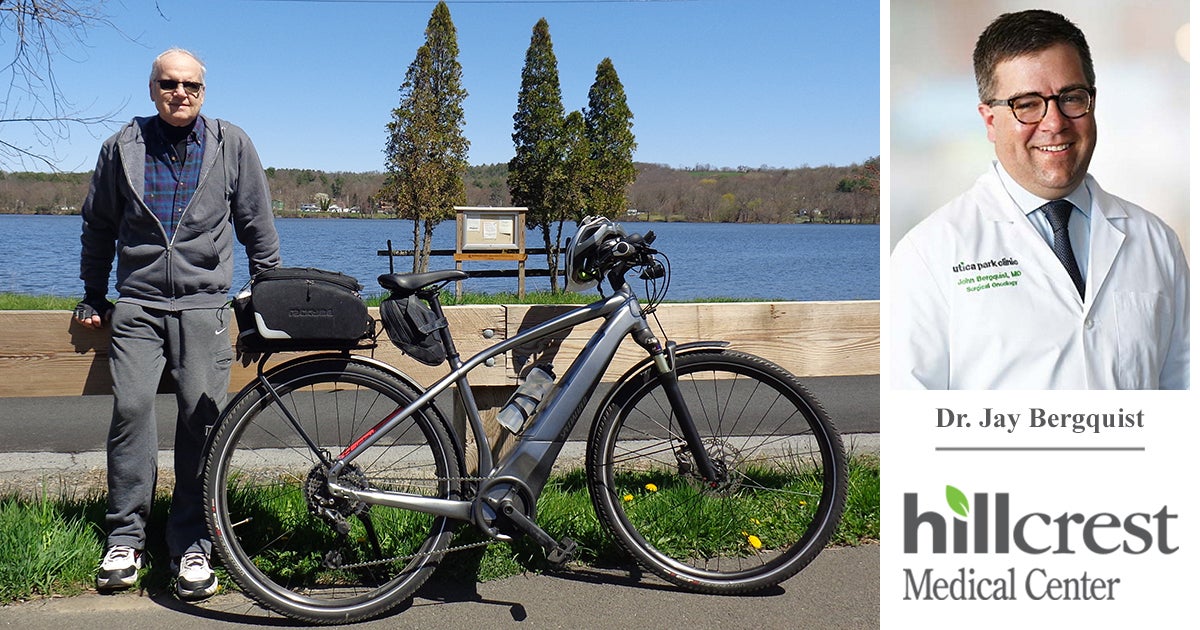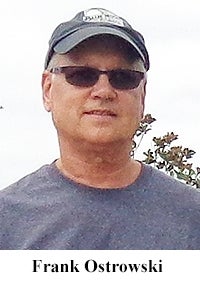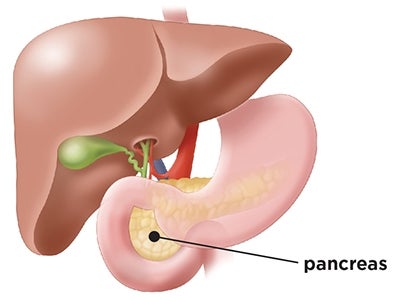
Like so many survivors before him, Frank Ostrowski's cancer journey turned his life upside down. But with the support of his family and the expert medical care he received, he has a brighter future, 1,400 miles away from where his journey began.
Frank Ostrowski, 69, a retired civil engineer, had lived in Tulsa, Oklahoma since 1978. An avid cyclist for many years, on average, he rode 22-25 miles a day a few times each week.
"Tulsa is just perfect for cyclists," Ostrowski recalled. "There are 100 miles of paved bike trails winding safely through the beautiful park system, so I never had to ride on the streets. I don't know if there's anything like it anywhere in the country."
Ostrowski had an established relationship with his primary care physician Beau Jennings, D.O. During his routine six-month appointment in February 2023, Ostrowski reported no concerns. Dr. Jennings suggested that they do a blood draw for a basic metabolic panel, which measures eight different substances in one's blood. This test is often used to screen for certain health conditions.
"Since I usually get the blood panel at my August appointment, I decided to wait. I felt just fine," said Ostrowski.
His early March bike rides started great, clocking in long rides of 30-38 miles each. But a week later, he stopped a ride at the 11-mile mark because of excessive fatigue. Soon he had lost ten pounds, was experiencing diarrhea and knew something was terribly wrong.
Many tests

After another visit with Dr. Jennings, Ostrowski underwent a blood panel test and a CT scan. "Dr. Jennings initially thought I had Hepatitis A or jaundice because my skin was turning yellow," recalled Ostrowski.
After the first CT scan showed something of concern, Dr. Jennings ordered a second, higher-resolution CT. He also told Ostrowski that he had consulted with Jay Bergquist, M.D., a surgeon on staff who specializes in diseases of the digestive tract, like the stomach, liver, intestines and pancreas.
"By then I had lost almost 20 pounds. I was going down pretty fast," said Ostrowski. Under sedation, he underwent an endoscopy – a procedure during which the physician inserted a flexible tube with a camera at the end into a vein to view any blockages.
"The next thing I knew I was waking up in the intensive care unit," he recalled. "During the endoscopy, the staff saw that bile ducts near my pancreas were clogged. That's why I had turned yellow and was losing weight. They installed a drain in my liver to help with the clogged fluids. They also took a biopsy of a tumor they saw on my pancreas."
During the week he spent in the hospital recovering from the endoscopy, Ostrowski was diagnosed with pancreatic cancer.
Big decisions
"When I was in the hospital, my brother and sister came to town to see me," said Ostrowski. "I was still pretty foggy, but they discussed my case in detail with the doctors. Dr. Jennings said that we are very fortunate to have Dr. Bergquist on staff because he has experience removing tumors from the pancreas."

After reviewing Ostrowski's case, Dr. Bergquist met with the family and recommended that he perform the Whipple procedure, an operation to remove the head of the pancreas that had the tumor. The procedure also involves removing the first part of the small intestine, called the duodenum, the gallbladder and the bile duct.
"I tell every patient that when you have a Whipple procedure, there is a slight risk of mortality within 30 days after the procedure," said Dr. Bergquist. "It's not that high, perhaps 2-5%, but it's not zero. It's higher than other elective surgical procedures, such as gallbladder or colon surgery. Those surgeries have mortality risks of less than 1%."
"Dr. Bergquist was straightforward with me and my siblings about what was wrong, what he was going to do, and what the risks of the surgery were," said Ostrowski. "He was brief and to the point, which I liked and deeply appreciated."
The surgery was scheduled a few weeks later, as Ostrowski needed time to rest and regain his strength after his time in the ICU. During that time, he and his family had big decisions to make.
Ostrowski knew that if he survived the difficult surgery, he would need a great deal of care going forward.
"If something bad should happen after the surgery, I didn't want a Tulsa friend to be burdened with any decisions," said Ostrowski. "That's why my siblings and I concluded that we needed to prepare to move to New York or Atlanta."
"I was very impressed with Frank's family," recalled Dr. Bergquist. "They dropped everything and traveled to Tulsa to care for him at a time when he really needed them. Moments like that help make my work very rewarding."
The surgery to remove as much of the tumor as possible from his pancreas was successful. Within a few weeks, Ostrowski put his house on the market, packed his belongings and began a six-month stint of chemotherapy, one session every two weeks.
Since Dr. Burgquist had a connection with a New York oncologist who could continue Ostrowski's chemotherapy, the family decided that he would move to Troy, New York to live near his sister.
Feeling better
These days, Ostrowski is recovering well from the surgery and is starting to increase his daily activities.
"I feel a lot better," he said, "though at first, I couldn't do much in between chemotherapy sessions. I had a little nausea from the sessions, but it was controlled with medications."
Ostrowski also researched biking trails along the Hudson and Mohawk Rivers in the area and has started riding again. "I love cycling because it feels like a full workout. You use your mind for direction and balance and your senses to see beautiful scenery and people."
He also offered "long-distance" thanks to the excellent staff at Hillcrest Medical Center and to the "extraordinary surgery skills and care" of Dr. Bergquist, which produced excellent results.
"I completed six months of chemotherapy in December, followed by a PET scan and a CT scan," Ostrowski said. "Both scans were negative for cancer. My weight has increased, I am getting stronger and feeling better every day.
"Thanks to you, Dr. Bergquist, I am considered cured of cancer. Your gift of life, of which I have few words to express my total gratitude, is very much appreciated."
For more information on cancer care at Hillcrest Medical Center, call 918-579-3850.
